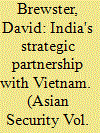| Srl | Item |
| 1 |
ID:
087341


|
|
|
|
|
| Publication |
2009.
|
| Summary/Abstract |
The 13 countries of ASEAN+3 are actively working towards creating a regional community in East Asia. At the same time, the regional countries have increasingly relied on web-based technologies to enable them to more efficiently use their resources. Even as this adoption of technology has assisted states, it has exposed them to new threats, with a growing number of East Asian networks and users now subject to a wide range of cyber attacks. These attacks have occurred within and across national boundaries with the transnational nature of cyber security making it difficult for governments to unilaterally securitize emergent cyber threats. As a result, it is becoming increasingly necessary for East Asian governments to protect their interests by working together. To do so effectively will require the adoption of policies and processes used to foster regional integration in other sectors and transfer them into the realm of cyberspace.
|
|
|
|
|
|
|
|
|
|
|
|
|
|
|
|
| 2 |
ID:
087343


|
|
|
|
|
| Publication |
2009.
|
| Summary/Abstract |
For more than 40 years, India and Vietnam have consistently stood together in resisting Chinese domination of Indochina. The relationship represents one of the few longstanding political partnerships between East and South Asia. In recent years, the two have been seeking to recalibrate their relationship in the context not only of China's growing economic and military power but also India's own security ambitions in the region. What are India's aspirations to project naval power into the South China Sea and how is this perceived in the region? This article looks at this longstanding political alliance in light of India's attempts at strategic engagement with Southeast Asia.
|
|
|
|
|
|
|
|
|
|
|
|
|
|
|
|
| 3 |
ID:
087347


|
|
|
|
|
| Publication |
2009.
|
| Summary/Abstract |
This review essay is based upon Shuja Nawaz' Crossed Swords: Pakistan, Its Army, and the Wars Within and Ayesha Siddiqa's Military Inc.: Inside Pakistan's Military Economy. Based upon these two author's insightful volumes, this essay explores the roles of both military and civilian actors and institutions in the undermining of Pakistan's constitutional rule of law. While conventional wisdom places the onus disproportionately upon the military's penchant for interventionism, this review essay contends that the army has intervened only with the active assistance of civilian institutions which are subsequently further eroded with every military takeover. Thus any long-term solution to democratize Pakistan must focus both upon the army's presumed "right" and "obligation" to intervene in Pakistan's political system while simultaneously strengthening and professionalizing those civilian institutions needed for providing good governance with accountability.
|
|
|
|
|
|
|
|
|
|
|
|
|
|
|
|
| 4 |
ID:
087346


|
|
|
|
|
| Publication |
2009.
|
| Summary/Abstract |
The asymmetry of energy resources has equipped China with powerful means of influence on North Korea. By drawing on both quantitative and qualitative data on the current energy and security dynamics in Sino-North Korean relations, this article examines China's energy assistance to North Korea from 2002 to 2007, emphasizing Pyongyang's growing dependence on China's energy supply. This article argues that China's provision of energy assistance, as a foreign policy tool, serves its goal of managing the nuclear crisis on the Korean peninsula. In the long run, China's energy engagement with North Korea will promote China's energy security, thereby fostering a favorable environment for Beijing's pursuit of both economic prosperity and regional stability.
|
|
|
|
|
|
|
|
|
|
|
|
|
|
|
|